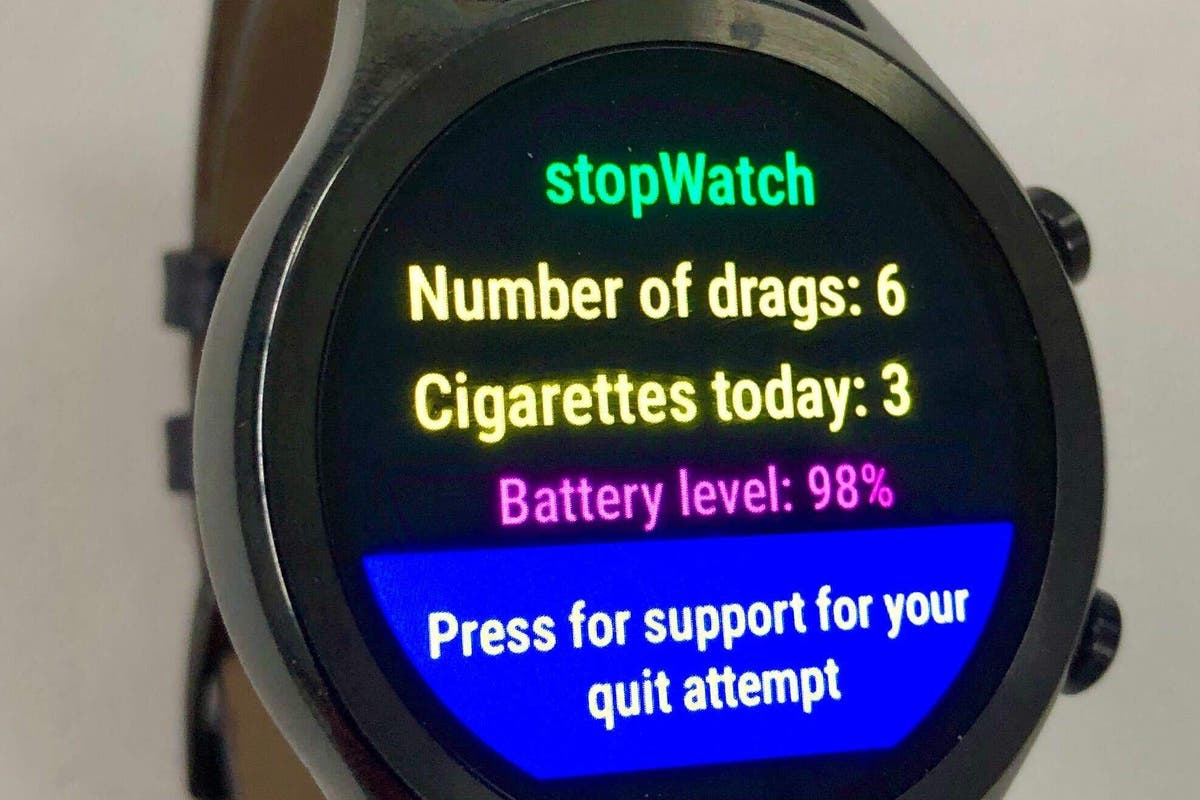Technology in smartwatches could help people quit smoking, according to researchers who have developed an app that intervenes when it detects gestures that indicate smoking.
The team at the University of Bristol developed software that uses the motion sensors in an Android smartwatch to detect common hand movements while smoking.
Once detected, the app will deliver a vibration alert with a text message designed by smokers and ex-smokers, and provide smoking cessation support on the smartwatch screen.
One of the messages reads: “Quitting smoking allows you to breathe easier.
After reading the message, participants could swipe it away or press a button to display information about accessing NHS smoking cessation support pages online.
Chris Stone, from the Tobacco and Alcohol Research Group at the University of Bristol, said: “For those who want to quit, an initial break is a vulnerable moment and carries the risk of a full relapse.
The study suggests that smartwatches can be a useful way to help people quit smoking, but more research is needed to understand how effective they are.
Alizee Froguel, Cancer Research UK
“People love smartwatches. They like the idea that it delivers a message at the point they smoke.
“So, if we can identify that point of weakness and do an intervention right there, we have an opportunity to improve the success of the quit attempt.
In implementing this project, our goal is to harness the latest thinking in intervention design and present it in a convenient wearable package with minimal user burden and maximum interaction with behavior change. And by doing so, make a difference in people’s lives.”
In this study, published in JMIR Formative Research, the smartwatch app was tested on 18 people who were interested in quitting smoking.
They wore a Ticwatch loaded with a custom app for two weeks, from the moment they woke up until they were instructed to charge it overnight.
Participants were also advised to remove the smartwatch when showering, swimming, or doing any activity that might injure it, such as contact sports.
At the end of the two-week period, they turned back the clock and completed a 27-question questionnaire.
Overall, 66 percent of participants said the smartwatch was acceptable to use with the technology, while 61 percent of study participants said the content of the messages was relevant to them.
Positive feedback included people reporting that the program raised awareness of smoking, made them feel positive about quitting, made them stop and think, smoked a little less, and provided ongoing encouragement.
The negative responses were that repeated messages lose their effectiveness, the message does not appear quickly enough, there is not enough variety of messages, and some were vague.
Alizee Froguel, director of prevention policy at Cancer Research UK, said: “Smoking is the biggest cause of cancer in the UK and quitting completely is the best thing you can do for your health.
The study suggests that smartwatches can be a useful way to help people quit smoking, but more research is needed to understand how effective they are.
There are many tools available to help people quit smoking, and getting support from your local free smoking cessation service will give you the best chance of successfully quitting.
To help create a smoke-free future, the UK Government must ensure that cessation services are sustainably funded and accessible to all.
To be eligible for the study, participants had to be between 18 and 70 years old and smoke more than 10 cigarettes per day with their right hand.
Individuals with any movement problems affecting their right hand or arm, or those who used e-cigarettes or any form of nicotine replacement therapy during the study period, were excluded from participation.
The researchers believe their app is the first timely intervention to prevent smoking relapse that runs entirely on a smartwatch and does not require pairing with a smartphone.
They call for a long-term efficacy trial as the next step, which could use more diverse messages.
Their work is part of the Smoking Cessation theme of the Integrated Cancer Research Epidemiology Program (ICEP).
Study, delivery and evaluation of a smartwatch-based intervention for smoking relapse (StopWatch): a feasibility and acceptability study, by Chris Stone et al is published in JMIR Formative Research.








